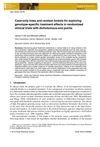 40 citations,
June 2013 in “Scientific Reports”
40 citations,
June 2013 in “Scientific Reports” A gene variant in KRT71 causes the curly fur in Selkirk Rex cats.
32 citations,
September 2013 in “Breast cancer research” A specific gene variant is linked to a higher risk of hair loss from chemotherapy in breast cancer patients.
3 citations,
April 2023 in “Veterinary sciences” Researchers found genes that may explain why some pigs grow winter hair, which could help breed cold-resistant pigs.
 103 citations,
March 2015 in “Nature Communications”
103 citations,
March 2015 in “Nature Communications” A genetic region near the PAX1 gene is linked to a higher risk of scoliosis in females.
1 citations,
October 2023 in “Animals” Certain DNA regions in alpacas are linked to fiber diameter.
 57 citations,
November 2017 in “Nature Communications”
57 citations,
November 2017 in “Nature Communications” Researchers found 71 genetic regions linked to male pattern baldness, which account for 38% of its genetic risk.
2 citations,
December 2020 in “Frontiers in genetics” Researchers found genes linked to feather growth speed in Shouguang chickens, highlighting two genes that might explain differences in feathering.
11 citations,
June 2015 in “Scientific Reports” The mtDNA N haplogroup is linked to a higher risk of late-onset lupus and specific symptoms in Han Chinese women.
 9 citations,
December 2017 in “The Journal of Allergy and Clinical Immunology”
9 citations,
December 2017 in “The Journal of Allergy and Clinical Immunology” New targeted therapies for hair loss from alopecia areata show promise, with personalized treatment expected in the future.
 29 citations,
February 2018 in “Genetics research international”
29 citations,
February 2018 in “Genetics research international” Certain genetic variations are linked to increased androgen levels in PCOS, but more research is needed to understand these connections fully.
22 citations,
January 2014 in “Journal of Interferon & Cytokine Research” Certain genetic variations in IL18 may increase the risk of alopecia areata in Koreans.
 21 citations,
December 2013 in “Archives of Dermatological Research”
21 citations,
December 2013 in “Archives of Dermatological Research” No link found between new male baldness genes and female hair loss.
 20 citations,
June 2019 in “Experimental Dermatology”
20 citations,
June 2019 in “Experimental Dermatology” The research suggests that autophagy-related genes might play a role in causing alopecia areata.
6 citations,
March 2020 in “Anais Brasileiros de Dermatologia” CTLA4 gene variants are not linked to alopecia areata in Monterrey's Mexican population.
 3 citations,
September 2019 in “PLOS ONE”
3 citations,
September 2019 in “PLOS ONE” Genetic variations affect dutasteride treatment response for male pattern hair loss.
 9 citations,
November 2012 in “Archives of Dermatological Research”
9 citations,
November 2012 in “Archives of Dermatological Research” MC4R gene variants not linked to female hair loss.
 38 citations,
February 2012 in “British Journal of Dermatology”
38 citations,
February 2012 in “British Journal of Dermatology” AR/EDA2R gene linked to early-onset female hair loss, but 20p11 gene not involved.
 August 2023 in “Sabuncuoglu Serefeddin Health Sciences”
August 2023 in “Sabuncuoglu Serefeddin Health Sciences” CT60 polymorphism might increase the risk of Alopecia Areata.
 November 2009 in “Medical & surgical dermatology”
November 2009 in “Medical & surgical dermatology” The document concludes that Borrelia afzelii causes a skin condition in France, a gene is linked to hair loss in Caucasian women, and various genetic mutations affect skin diseases.
 16 citations,
June 2017 in “Advances in Therapy”
16 citations,
June 2017 in “Advances in Therapy” New treatments for hair loss are showing promise due to better understanding of genetics and the immune system.
 50 citations,
March 2001 in “Clinics in Dermatology”
50 citations,
March 2001 in “Clinics in Dermatology” Genes and hormones cause hair loss, with four genes contributing equally.
14 citations,
January 2019 in “PubMed” Vitamin D might be involved in the development of alopecia areata and could help in its treatment.
 144 citations,
July 2015 in “Clinical, Cosmetic and Investigational Dermatology”
144 citations,
July 2015 in “Clinical, Cosmetic and Investigational Dermatology” Alopecia areata is a common autoimmune disease affecting about 2% of people, causing significant disability and often associated with mental health issues and other autoimmune conditions.
 34 citations,
October 2017 in “Archivos Argentinos De Pediatria”
34 citations,
October 2017 in “Archivos Argentinos De Pediatria” Alopecia Areata is a complex, unpredictable autoimmune hair loss condition with limited treatment options and a significant psychological impact.
 51 citations,
November 2011 in “British Journal of Dermatology”
51 citations,
November 2011 in “British Journal of Dermatology” A gene called HDAC9 might be a new factor in male-pattern baldness.
 6 citations,
November 2019 in “The application of clinical genetics”
6 citations,
November 2019 in “The application of clinical genetics” The study found that a specific genetic variation in the TNFα gene is significantly linked to Alopecia Areata in the Jordanian Arab population.
 5 citations,
July 2019 in “Applied statistics/Journal of the Royal Statistical Society. Series C, Applied statistics”
5 citations,
July 2019 in “Applied statistics/Journal of the Royal Statistical Society. Series C, Applied statistics” Case-only trees and random forests improve predictions of treatment effects in clinical trials.
 43 citations,
December 2020 in “PLOS Genetics”
43 citations,
December 2020 in “PLOS Genetics” New method finds genetic links between Type 2 Diabetes and Prostate Cancer not seen before.
 308 citations,
December 2018 in “PLOS Genetics”
308 citations,
December 2018 in “PLOS Genetics” The research found that PCOS has common genetic factors regardless of how it is diagnosed and is linked to metabolic and reproductive issues.
 25 citations,
July 2013 in “Journal of Dermatological Science”
25 citations,
July 2013 in “Journal of Dermatological Science” Six new hair loss factors in men not linked to female hair loss.






















